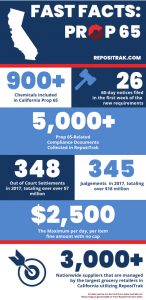Contributed By Shawn Stevens, Food Industry Counsel, LLC., a ReposiTrak partner who helps our customers understand the requirements of California Proposition 65.
The Safe Drinking Water and Toxic Enforcement Act, better known as Proposition 65, is a controversial California law that requires businesses to warn consumers of products containing any of approximately 900 chemicals “known by the State of California to cause cancer or birth defects.” Particularly controversial are the enforcement provisions, which permit private citizens, advocacy groups and Plaintiff’s attorneys to sue and to collect damages on behalf of the state. The law, passed by California voters in 1986, has been credited with a reduction in cancer-causing chemicals from many products, but is also criticized for enriching plaintiffs’ attorneys in what amounts to settlement shakedowns.
Currently, there is a fierce legal battle brewing in the case, Council for Education and Research on Toxics (CERT) v. Starbucks Corp. et al., over warnings (or lack thereof) on coffee. The lawsuit, filed approximately eight years ago by CERT, alleges that Starbucks and 90 other coffee roasters and retailers were in violation of California’s Proposition 65 by failing to warn consumers that coffee contains acrylamide, a carcinogen.

Acrylamide is used in many industrial processes, but, according to the American Cancer Society, it also occurs naturally when starchy foods are cooked. Acrylamide is found in coffee because the raw beans are roasted before they’re brewed.
There is widespread disagreement about whether the acrylamide levels in coffee pose a cancer risk. Though the scientific data addressing the health risks/benefits of coffee has long been unsettled, recent research has been very favorable for coffee. In 2016, the World Health Organization removed coffee from its “possible carcinogen” list, citing studies that indicate coffee may reduce the occurrence of liver and uterine cancers and is unlikely to cause breast, prostate or pancreatic cancer.
Nonetheless, the Coffee Case has not gone well for the Coffee Companies. After losing the first phase of trial over whether acrylamide posed “no significant risk” to consumers, the Coffee Companies began a second phase late last year over whether they qualify for a so-called “alternative significant risk level” exemption. They lost again. The Court ruled that California companies must post Proposition 65 warnings on coffee. This has caused significant and widespread confusion and anger.
The Coffee Case is likely to continue for years and may eventually end up in the United States Supreme Court.
One of the more interesting defenses used by the Coffee Companies is on First Amendment grounds. Specifically, counsel for Dunkin’, moved the court to dismiss the case, arguing that companies can only be compelled to issue speech that is “purely factual, not controversial.” The argument is on point with a recent Supreme Court case—also involving a California law—in which the Court held “government-drafted scripts” may only be compelled when they contain “purely factual and uncontroversial disclosures” that “are not misleading” and are neither “unjustified [n]or unduly burdensome.” Given the debate over the health benefits of coffee, the cancer warnings are most assuredly controversial. The judge, puzzlingly, rejected Dunkin’s First Amendment argument, contending that the case law was unpersuasive.
Another interesting Constitutional defense involves federal preemption. Federal preemption is the invalidation of a U.S. state law that conflicts with federal law. In essence, preemption stands for the proposition that federal laws and regulations trump state laws when there is a conflict between the two. Here, the Coffee Companies argue that FDA regulations conflict with California law, and thus, the California law is invalid. Again, the court rejected the argument. Again, the ruling was puzzling.
For one, the rulings seemed to fly in the face of public statements made (in advance of the court’s rulings) by Scott Gottlieb, head of the FDA. Gottlieb noted that research has found little evidence that coffee causes cancer: “Strong and consistent evidence shows that in healthy adults, moderate coffee consumption is not associated with an increased risk of major chronic diseases, such as cancer, or premature death, and some evidence suggests that coffee consumption may decrease the risk of certain cancers.”
The cancer label warning, he went on, may “mislead consumers to believe that drinking coffee could be dangerous to their health when it actually could provide health benefits.” Furthermore, Gottlieb asserted that “if a state law purports to require food labeling to include a false or misleading statement, the FDA may decide to step in.” The statements squarely favored the defendants on both issues, yet the Court ruled the other way. In rejecting the preemption argument, the Court held that an FDA pronouncement is insufficient to preempt state law claims in the absence of an actual federal law. The ruling appears to be inconsistent with California precedent.
Second, the rulings were seemingly contrary to recent precedent. Consider Post Foods v. Superior Court, a similar California case, ruled on in July. In that case, a Plaintiff filed a lawsuit concerning the lack of acrylamide warnings on dozens of cereals sold by three large cereal companies. Cereal, like coffee, contains acrylamide. However, in the cereal case, the California Court of Appeals ruled that the claims were preempted. The ruling was based on an FDA Letter sent to California, which stated “premature labeling of many foods with warnings about dangerous levels of acrylamide would confuse and could potentially mislead consumers, both because the labeling would be so broad as to be meaningless and because the risk of consumption of acrylamide in food is not yet clear.”
Adding further to the confusion and chaos, California’s Office of Environmental Health Hazard Assessment, which implements Proposition 65, recently published a proposed rule specifically stating that coffee does not need a warning. FDA expressed written support of the OEHHA’s proposed exemption for coffee warning labels.
It seems clear from this case and others that Proposition 65 is in dire need of significant reform. In the meantime, it remains unclear what will ultimately become of the Coffee Case and others like it. Most likely, the recent rulings will be appealed. For now, companies are facing enormous risk. Several defendants, including 7-Eleven Inc. and Yum Yum Donut Shops Inc., already paid millions to settle out of the lawsuit, agreeing to post the warnings regardless of the case’s outcome.
Breaching Proposition 65 can result in fines of up to $2,500 per violation, meaning the ultimate total in the Coffee Case could reach into the billions, although such a result is highly unlikely. It is imperative that companies doing business in California take all necessary steps to protect against these claims. Hiring experienced attorneys or consultants to evaluate and help mitigate your exposure is a good first step.
Whatever happens, it seems certain that Proposition 65 will remain a controversial brewing grounds for debate in the years to come.


Shawn Stevens is the founding member of Food Industry Counsel LLC. As a food industry consultant and lawyer, Stevens devoted his entire practice to representing the food industry. Over the course of the past two decades, he has worked globally with food industry clients (including the world’s largest food processors, food distributors, and some of the largest restaurant and grocery chains) protecting their brands by developing food safety programs, complying with FDA and USDA regulations, managing recalls, and defending high-profile foodborne illness claims.
Additional information about his food safety and quality consulting and legal practice can be found at Food Industry Counsel, or visit Food Industry Counsel’s feature page on ReposiTrak.com.

